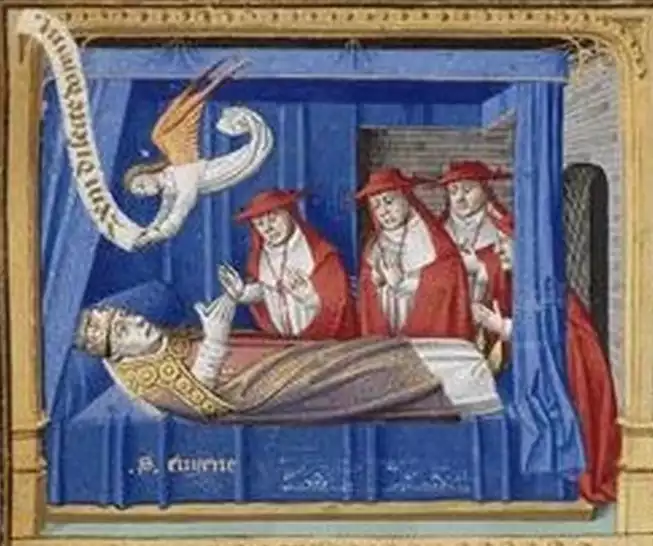
Born a Cistercian monk, Pope Eugene III ascended as pontiff, fervently initiating the Second Crusade in 1153. His tenure marked a pivotal epoch, intertwining faith and conflict, leaving an indelible imprint on ecclesiastical history.
The Second Crusade: Eugene’s Call
Pope Eugene III, born as Bernardo Pignatelli, embarked on his ecclesiastical journey within the tranquil confines of the Cistercian Order, a life markedly distant from the papal throne he was destined to ascend in 1145. His unexpected elevation from the cloister’s quietude to the epicenter of religious power was a testament to his profound spirituality and unwavering devotion. Eugene’s papacy coincided with a period of intense turmoil and transition within Christendom, a time when the fervor of faith frequently ignited the flames of conflict.
Eugene III’s ascension to the papacy was a beacon of hope for those yearning for a shepherd who could navigate the church through the tempestuous seas of political intrigue and spiritual decay. His Cistercian roots, deeply embedded in a tradition of contemplative piety and rigorous discipline, were reflected in his approach to the papal office. He was a pontiff who sought not only to administer but to inspire, to not just govern but to guide the faithful towards a closer communion with the divine.
The hallmark of Eugene III’s pontificate was his impassioned proclamation of the Second Crusade. This clarion call was not merely a response to the fall of the County of Edessa to Muslim forces but a profound expression of his desire to unite Christendom under the banner of faith and sacrifice. The crusade’s inception, marked by the issuance of the papal bull Quantum praedecessores, was a historic moment, intertwining the destiny of Europe with that of the Holy Land.
Eugene III’s papacy was a delicate balancing act, navigating the intricate web of European politics while endeavoring to kindle a spiritual revival within the church. His tenure was marked by fervent diplomatic engagements, as he sought to fortify the papacy’s position amidst the power struggles of secular rulers. Notable among his diplomatic endeavors was his interaction with the influential Bernard of Clairvaux, a figure whose spiritual authority and counsel were instrumental in shaping the course of Eugene’s papal policies.
Despite his earnest efforts, Eugene III’s papacy was fraught with challenges. His initiatives often met with resistance, not only from external adversaries but also from within the church’s own ranks. The complexity of his role as a spiritual leader in a time of political upheaval was evident in the mixed reception of his crusading efforts. While some lauded his vision, others were skeptical of the crusade’s efficacy and the toll it exacted on the populace and resources of Christendom.
Eugene III’s tenure was also a period of significant intellectual and cultural flourishing. It was a time when the seeds of scholasticism were being sown, and theological discourse was evolving with newfound vigor. The pontiff’s own intellectual curiosity and commitment to ecclesiastical reform fostered an environment where ideas could thrive and the church’s doctrinal foundations could be fortified.
As the narrative of Eugene III’s papacy unfolds, it becomes evident that his life was a mosaic of triumphs and trials, of aspirations and adversities. His journey from the quiet corridors of a Cistercian monastery to the zenith of religious authority is a testament to the unpredictable tides of fate and the enduring power of faith. In navigating the complexities of his time, Eugene III left an indelible mark on the tapestry of history, weaving a legacy that resonates with the echoes of his zeal, his struggles, and his unwavering commitment to the spiritual upliftment of Christendom.
In the annals of history, Eugene III emerges as a figure of paradoxes – a monk who became a pontiff, a spiritual shepherd entangled in worldly affairs, and a crusader whose quest for unity was fraught with division. His story is a vivid tapestry of the human and the divine, a narrative that continues to captivate and inspire, reminding us of the enduring legacy of a pope whose life was a testament to the power of faith, the complexity of leadership, and the relentless pursuit of a vision that transcended the boundaries of his time. As the chapter of Eugene III’s life unfolds, it is clear that his story is far from concluded, his influence still palpable in the corridors of history, urging us to delve deeper into the saga of a pontiff whose reign was as tumultuous as it was transformative. The tale of Pope Eugene III, a Cistercian monk turned crusading pontiff, remains an unfinished symphony, echoing through the ages as a reminder of the intricate interplay between faith, power, and the indomitable spirit of human endeavor.
Pope Eugene III’s tenure, a complex tapestry of spiritual zeal and political turmoil, profoundly shaped medieval Christendom. His legacy, marked by the fervent call of the Second Crusade, reflects the enduring struggle to reconcile faith’s ideals with worldly affairs. His story remains a compelling narrative of leadership, devotion, and the ceaseless quest for spiritual and temporal harmony.
References
Barraclough, Geoffrey. “The Medieval Papacy.” Thames and Hudson, 1968.
Constable, Giles. “The Reformation of the Twelfth Century.” Cambridge University Press, 1996.
Sayers, Jane. “Papal Government and England During the Pontificate of Honorius III.” Cambridge University Press, 1984.
Tyerman, Christopher. “God’s War: A New History of the Crusades.” Belknap Press, 2006.
